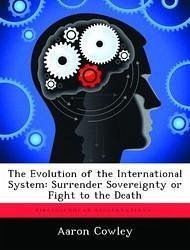This thesis presents a long-term, multi-disciplinary view of international relations that incorporates realism, liberalism, and constructivism into a distinct new theory. It focuses on the proposal that the international environment is a social system, driven by self-interest characterized by the larger evolutionary process. The analysis argues that human social evolution employs cooperation to fulfill self- interest. As cooperation increases, human social groups self-organize and amalgamate into larger groups and higher-order social constructs, creating the international system. Societies evolve and develop culture specifically to encourage and enforce cooperation. As evidenced by the spread of democracy, societies mimic and copy cultural aspects of more successful societies to reap the benefits of cooperation. Just as social constructs cooperate to meet the needs of the individual, states also cooperate to meet the needs of their own populations.








